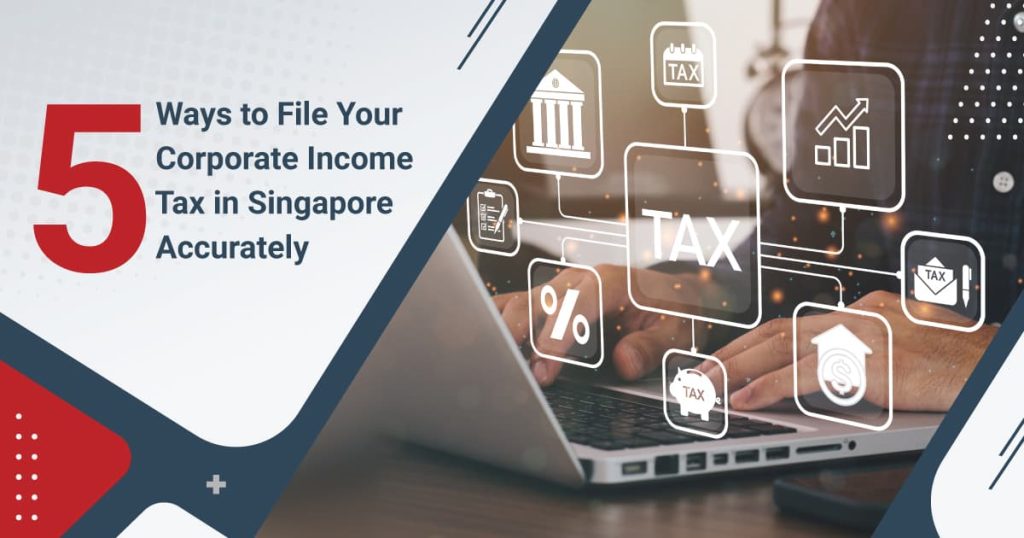Singapore is renowned for its status as a tax haven with one of Asia’s most attractive corporate tax systems.
However, it does not eliminate the need to file their corporate taxes correctly and accurately.
Every year, companies in Singapore need to file their corporate income tax returns while adhering to the prevailing compliance measures. How can these companies file their returns properly for a smooth filing experience?
We take a closer look at some useful information to know!
What is Corporate Income Tax in Singapore?
All corporations in Singapore must pay corporate tax as stipulated under the Income Tax Act regardless of their tax residency.
Corporate tax is paid on chargeable income obtained from Singapore or income from overseas that is remitted into the country.
Companies in Singapore are taxed at the prevailing corporate tax rate of 17%.
FREE Online Singapore Corporate Income Tax Calculator
Why is it Important to File Your Corporate Taxes Correctly?
Corporate tax compliance is extremely important in Singapore.
It is important to file your corporate taxes correctly while adhering to compliance requirements because IRAS can impose penalties for incorrect or late filings.
These penalties can be significant, so it is important to make sure your filings are accurate and on time.
How Can You File Your Corporate Income Tax Accurately?
There are a few measures that may help to ensure that you file your corporate income tax correctly and avoid penallties.
Understand Taxable and Non-Taxable Income, Deductibles and Non-Deductibles
What falls under taxable and non-taxable income? What business items can be deducted?
Understanding the items categorised under each section will help you to better derive an accurate tax figure.
Taxable income refers to:
- Gains from trade or business
- Investment income
- Property-derived royalties and premiums
- Other income-based profits
Non-taxable income refers to:
- Capital gains
- Profits on foreign exchange on capital transactions
- Shipping income from a shipping company that is exempted from taxes
- Service income obtained by a resident business
- The sale of fixed assets
- Other types of tax-exempt income as stated under the Singapore Income Tax Act 1947
Deductibles include:
| Applicable Business Expenses | Capital Allowances | Unused Losses and Donations |
|---|---|---|
|
|
|
| Non-Deductible Business Expenses | Non-Deductible Capital Allowances | – |
|
|
Related Read: 6 Ways to Lower Your Corporate Taxes in Singapore Legally »
Determine Whether You Must File Your Corporate Tax Return
Unsure whether you have to file your corporate tax return? Here are examples of companies that must also file them:
- Newly incorporated company in 2023 that has started a business or obtained income, and closed their first set of accounts in 2023
- Company had a loss position for FY2023
- Dormant company in FY2023
- Company with YA 2023 tax assessment under IRAS’ review
Companies that have incorporated in 2022 or 2023 but closed their first set of accounts in 2023 and did not start their business or gained income in the same year need not file their corporate tax return.
Determine if You Need to File a Form C, Form C-S, or Form C-S (Lite) Corporate Income Tax Return
Which type of corporate tax return do you need to file yours under?
Here are the characteristics of companies that fall under each type of return:
Form C-S
- For businesses incorporated in Singapore
- Have a yearly revenue of S$5 million or below
- Taxable income is at the rate of 17%
- Is not claiming these:
- Group relief
- Investment allowance
- Carry-back of capital allowances or losses in the current year
- Foreign tax credit and tax deducted at their source
Form C-S (Lite)
- For businesses that qualify to file Form C-S (Lite) with yearly revenue of S$200,000 or below
Form C
- For businesses that do not qualify for Form C-S or Form C-S (Lite)
- Companies filing Form C must file their financial statements, supporting schedules, and tax computations together
File Your Corporate Income Tax Return Before it is Due
In May 2022, IRAS announced that this year’s corporate tax filing deadline for the Year of Assessment (YA) 2022 is on 30 Nov 2022.
It is advised that companies file their corporate tax returns before this due date to ensure that they are accurate.
Related Read: What Are 4 Key Business Insights of Singapore Budget 2023?
Know the Common Filing Mistakes to Avoid
There are several commonly seen filing mistakes that IRAS has recognised.
They are:
- Understating your income i.e. not including receipts or invoices or cash transactions
- Failing to keep adequate accounts or records, therefore leading to understated sales or overstated expenses
- Making inaccurate claims for non-deductible expenses, such as s-plated cars purchased for business use
- Abusing tax exemption schemes for businesses
- Inaccurate transfer pricing by failing to price related party services according to the arm’s length principle
- Industry-specific errors, like omission in Form IR8A for family-owned firms
What Are the Penalties for Filing Incorrect Corporate Tax Returns in Singapore?
Your corporate tax returns are audited by IRAS and if there are inaccuracies or omissions found, your company may receive a penalty.
The type of penalty is classified accordingly:
| With Tax Evasion Intention | Without Tax Evasion Intention |
|---|---|
|
|
Penalties for Late Filing or Failing to File Tax Returns
Companies that do not file their corporate taxes or do not file them before the deadline are liable to certain consequences.
They include:
- Issuing an estimated Notice of Assessment (NOA)
- Compounding of Offence
Your Corporate Income Tax Returns Are in Good Hands With InCorp
Treading the complicated corporate taxation landscape in Singapore can be especially difficult for those who are unfamiliar or have not filed their taxes before.
Corporate taxation advisors like InCorp’s team of reliable and experienced professionals can help you file your corporate tax properly.
We take the utmost care to make sure that your corporate tax filing goes smoothly and successfully!
FREE Online Singapore Corporate Income Tax Calculator
Contact our team
FAQs
Do I need to file my corporate taxes if I have no income?
- If you did not obtain any income and did not close your first set of accounts in 2023, you need not file your corporate taxes.
What is the corporate tax rate for 2023?
- The prevailing corporate tax rate for 2023 is 17%.
Should I file my corporate tax myself or engage an accountant to do it?
- While you can file your corporate tax yourself, it is advised to seek the help of a taxation expert to avoid incorrect corporate tax filing.





